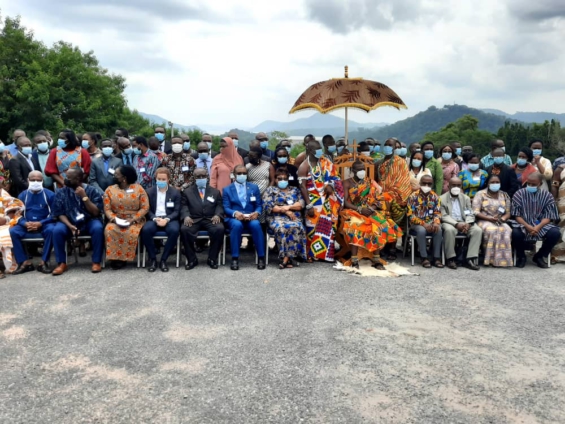Senior Research Scientist at the University of Environment and Sustainable Development, Dr Gibrilla Abass says government effort in ending the menace of illegal mining and its associated devastation to the environment cannot be sustained if the State doesn't collaborate with Academia and industry players.
According to Dr Abass, the country is likely to miss out on Sustainable Development Goal Six which seeks to ensure the provision of potable drinking water for its citizens in an event that the illegal menace is not curbed.
The lecturer said the state must foster collaboration with social and political scientists among others to find a more sustainable means to curb the menace.
“We need to link up the hardcore sciences with the social and political sciences so that when you're addressing some of these issues we don't have that disconnect.
“Yes when you go for the natural science and you see pollution at an alarming state, the first thing you will do is to raise the red flag that it should be stopped, now when you stop it, what alternative are you giving to the people? Until we begin to think about what alternative we give to the people who depend solely on this as their means of livelihood, then I think we can't get anywhere and I think that is where the focus of our discussion must be."
He also explained that “we can still mine and get the full potential of our natural resources at the same time protect our environment and natural resources.”
Dr Gibrilla was speaking at the first International Sustainable Development Conference organised by the University of Environment and Sustainable Development.
The conference brought together non-governmental organisations, civil society organisations, political actors and members from Academia to share ideas on sustainable development within the Sub-Saharan Africa context.
Vice-Chancellor of the University of Environment and Sustainable Development- Somanya Prof. Eric Nyarko Sampson said the University is poised to follow its mandate to research and profess sustainable solutions to the teething problems of the Country and Sub-Saharan Africa.
'We think that the focus must be on the environment, how do we protect, secure and make the environment sustainable. In sustainability, we are talking about the implications of our actions towards the environment now,” Prof Nyarko Sampson mentioned.
According to Professor Nyarko, the University is working with industry in the formulation of their curricula in order to bridge the gap and produce relevant human resources for development.
Resident Director of Fredrich Ebert-Stiftung Ghana, Johann Ivanov called on African leaders to show political will towards the achievements of the Sustainable Development Goals.
Latest Stories
-
Gold Fields Ghana Foundation challenges graduates to maximise benefits of community apprenticeship programme
1 hour -
GBC accuses Deputy Information Minister Sylvester Tetteh of demolishing its bungalow illegally
1 hour -
Boost for education as government commissions 80 projects
2 hours -
NAPO commissions library to honour Atta-Mills’ memory
2 hours -
OmniBSIC Bank champions health and wellness with thriving community walk
2 hours -
Kora Wearables unveils Neo: The Ultimate Smartwatch for Ghana’s tech-savvy and health-conscious users
2 hours -
NDC supports Dampare’s ‘no guns at polling stations’ directive
2 hours -
Police officer interdicted after video of assault goes viral
2 hours -
KNUST’s Prof. Reginald Annan named first African recipient of World Cancer Research Fund
2 hours -
George Twum-Barimah-Adu pledges inclusive cabinet with Minority and Majority leaders
3 hours -
Labourer jailed 5 years for inflicting cutlass wounds on businessman
3 hours -
Parliament urged to fast-track passage of Road Traffic Amendment Bill
3 hours -
Mr Daniel Kofi Asante aka Electrician
3 hours -
Minerals Commission, Solidaridad unveils forum to tackle child labour in mining sector
3 hours -
Election 2024: Engagement with security services productive – NDC
3 hours

